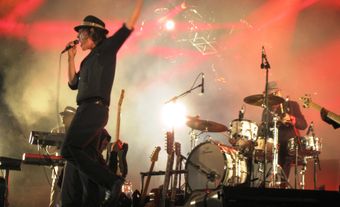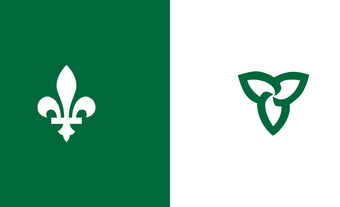Lavoie, Daniel
Daniel Lavoie, music writer-composer-performer (b at Dunrea Man. 17 March 1949).Daniel Lavoie learned the piano from nuns when he was very young and continued his musical education at the Jesuit boarding school, Collège de St-Boniface, in St. Boniface, Manitoba.
He had a peaceful childhood in the heart of the prairies and wide-open spaces. As a child, he wanted to become a doctor, but later, when he was working as a nursing assistant, he realized that the medical profession did not suit him. He also worked as a sailor on an oil tanker.
In his adolescence, his musical abilities led him to play in rock bands such as Nomads. At about age 18, he began writing music and became a singer-performer. In 1967, he won the writer-composer-performer competition on the Société Radio-Canada program Jeunesse oblige. Daniel Lavoie, who sings as well in English as he does in French, was part of the groups Spectre and Dieu que l'amour vous aime before going on tour in 1970. He moved to Québec in 1970 and performed mainly in piano bars. In 1975, he released his first album, À court terme. His song J'ai quitté mon île" was successful in France, Portugal and Brazil (under the title of
Deixei Mihaterra") before becoming popular in Québec.
His album Berceuse pour un lion followed, which was written mainly at St-Côme-de-Beauce. It includes several titles played on Québec radio, such as Dans l'temps des animaux". But it was in 1979, when the album Nirvana bleu was released, that Daniel Lavoie became truly popular with the public. In fact, the songs
Angéline",
La danse du smatte" and
Boule qui roule" impressed Québec listeners and even French critics, who literally sang Daniel Lavoie's praises. However, when he wrote
La danse du smatte", he had been sitting near a tree in Lafontaine Park, feeling hopeless. In one sitting, he composed that piece of music, which proved to him that being patient while waiting to be launched into the music world was probably necessary for his dreams to come true.
He next had the opportunity to perform at the Petit Montparnasse in Paris. A series of shows ensued in Québec, Ontario, Paris and Belgium. His reputation grew at a phenomenal rate, and in two consecutive years, he received the Félix for male performer of the year (1980 and 1981). During that period, he released the English-language album Cravings and the French language album Aigre-doux, How are you. Then Daniel Lavoie spent 15 months writing and a considerable amount of money to produce the album Tension attention, for which he won three Félix awards in 1984, including song of the year for Tension Attention". His piece
Ils s'aiment", a song without a chorus that he had written during the Beirut war, was played around the world. It sold more than two million copies in Québec and Europe. English, Spanish and Portuguese versions were also released. In 1985, the album won the Midem d'or at Cannes. With this triumph, Daniel Lavoie and Rehjar Rancourt became co-owners of the Trafic record label, which launched the recording careers of Marie Philippe, the group Hart rouge and Luc Delarochellière.
During 1984, Daniel Lavoie produced his Hôtel de rêve show at Spectrum and Théâtre St-Denis in Montréal before appearing in Paris, Lausanne, Toulouse and all over Europe as well, a tour that earned him a Félix as the most renowned artist outside Québec. In 1986, Daniel Lavoie won the Médaille Jacques-Blanchet for the quality of his work. He also won the Prix Québec/Wallonie-Bruxelles.
In 1986, Daniel Lavoie released his album Vue sur la mer. The highly anticipated record included the song Je voudrais voir New-York", which rose to the top of popular songs on French-language radio. Daniel Lavoie also won the Trophée Renonciat in 1987 thanks to that undeniably harmonious piece. With the album Vue sur la mer, he also won the prize for the best Francophone album.
Next he recorded Tips, an album in English, and, on European soil during his time at the Olympia in Paris, his album Olympia 87. Before the Long courier album came out, he had the chance to appear on TV in New York with Liza Minnelli, Bruce Springsteen, Sting, Peter Gabriel and Michel Rivard during Amnesty International's sole Human Rights Now show presented at Montréal's Olympic Stadium. Concerned with the survival of the planet and the legacy he wants to leave his children, Daniel Lavoie is spokesperson of the Fédération canadienne pour l'alphabétisation en français (FCAF) and the Juvenile Diabetes Research Foundation.
In 1990, for the Long courrier album, Daniel Lavoie won the Félix for pop-rock album, and the Francofolies de Montréal organized a show in his honour: La fête à Daniel Lavoie. In 1991, he composed the theme song for the film Le fabuleux voyage de l'ange by Jean-Pierre Lefebvre, and he brought painter Eugène Delacroix's work to life in the rock opera Sand et les romantiques by Catherine Lara and Luc Plamondon. That was also the year that Daniel Lavoie participated in the Francofolies de Bulgarie. In 1992, he received the Prix de la chanson française at the Festival d'été de Québec. Meanwhile, two new albums came out: Douce heure, a compilation of the prolific singer's work, and Here in the heart, an album in English. In 1995, after a long legal saga, the album Ici came out, with tender and sentimental numbers including Nantucket", which Louise Forestier composed especially for her great friend. Along the same lines, Daniel Lavoie composed a song for her,
Je ne pensais pas". She turned down the offer to interpret it herself but later truly regretted that decision because the song became one of the most beautiful in the Québec repertoire. The fact that its author, Daniel Lavoie, sings it makes it even more magnificent.
In 1966 and 1967, Daniel Lavoie explored the world of children's songs. His tune Bébé dragon 1" won him a Félix in the children's album category. With Divan vert in March 1997, he put out an album bringing together his greatest successes along with some previously unpublished pieces.
In 1997-1998, Daniel Lavoie stayed in Paris for seven months to play the archdeacon Claude Frollo in a musical comedy version of Victor Hugo's majestic work Notre-Dame de Paris by Luc Plamondon and Richard Cocciante. In 2002, he played the pilot in the musical Le petit prince by Richard Cocciante based on the poetic and philosophical story by Antoine de St-Exupéry. In 2003, Daniel Lavoie recorded a solo album in Paris and continued his composing work for some other artists, including Maurane, Florent Pagny, Jean Guidoni and Nolwenn Leroy.
On 27 January 2004, Daniel Lavoie released his album Comédie humaine. In 2005, he played the role of Félix Leclerc in Claude Fournier's TV series, which received very poor reviews from the media and the public. In 2007, he released Docteur tendresse and, more recently, his set Où la route mène, which includes two CDs and a DVD of video clips.
Daniel Lavoie says that he needed nearly 20 years to find himself, but he has learned to listen to himself more and he is proud of his work. His dream is to put on an opera, a project that will certainly come about thanks to his great perseverance and philosophy on life: Don't put off until tomorrow what you can do today", that is,
don't put off happiness" [translation].

 Share on Facebook
Share on Facebook Share on X
Share on X Share by Email
Share by Email Share on Google Classroom
Share on Google Classroom


